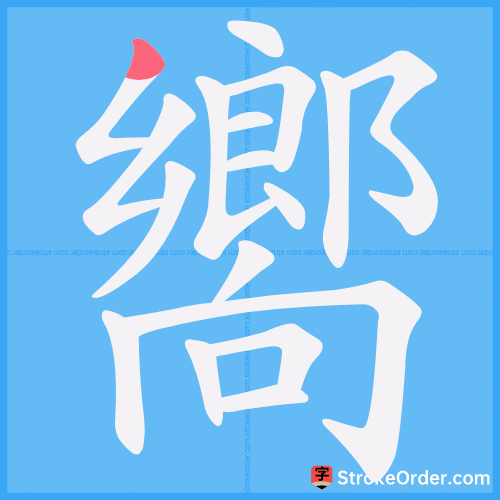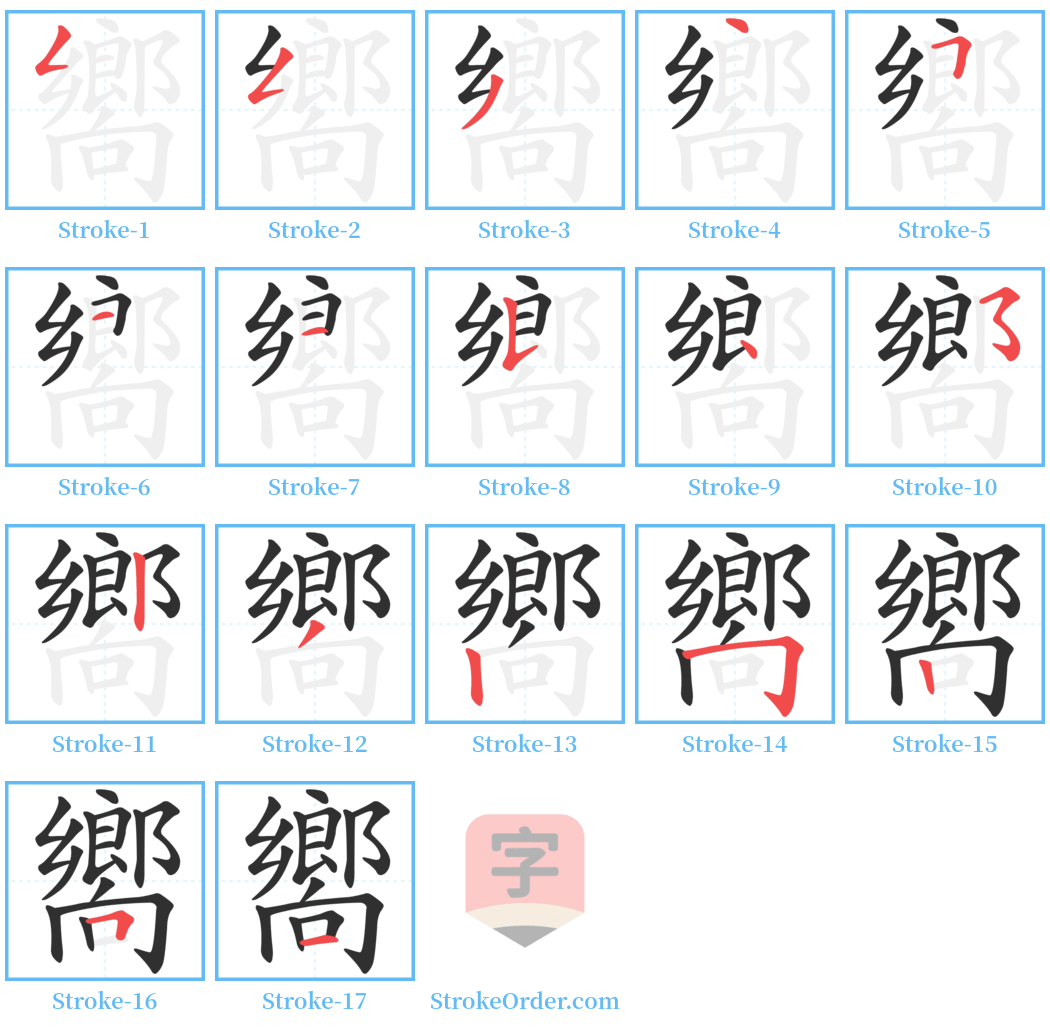嚮 Stroke Order
Animated Stroke Order of 嚮

Stroke Order Diagrams for 嚮

Step-by-Step Handwriting Guide for 嚮

Learn to Write Chinese Characters with Video Tutorials
Watch the video of writing the Chinese character "嚮", learn the correct stroke order (笔顺) of the character "嚮", and master the standard way of writing the character "嚮".
Free Printable Handwriting Practice with Stroke Order: 嚮
Printable Writing Practice Worksheet of "嚮" in Portrait Orientation (Tian Zi Ge)

Printable Writing Practice Worksheet of "嚮" in Landscape Orientation (Tian Zi Ge)

Information of 嚮
Pinyin
xiàng
Radical
口
Strokes
17 strokes
Usage
★★★
Definition
to tend toward / to guide / variant of 向[xiang4]
Definition of 「嚮」:
1. Trend; towards.
2. Direction. Tang Dynasty Liu Zongyuan.
3. Close; nearing.
4. Induce; guide.
5. Window.
6. Former; original.
1. Trend; towards. In the "Jiyun • Yangyun": "Xiang, face it. Sometimes derived from 'xiang'." In the "Book of Documents • Duoshi": "Toward the summer, it was not able to serve the Emperor." Kong Yingda's commentary: "Heaven goes toward them then." In "Records of the Grand Historian • Biography of the Sima": "Ximen Bao, with a pen poised, stood by the river waiting for a long time." Qing Dynasty Zhang Wang in "Country Governance": "Public sentiment is in favor or against, and it tests my governance."
2. Direction. In Tang Liu Zongyuan's "Poem for Sending My Cousin Chang Home After the Exam": "Advance without knowing where to go, retreat without knowing how to hold." In Qing Qian Muan's "Tang Sound Examination on Ancient Titles and Lyrics": "Clearly separated into two, it misleads people, causing later students to be confused and not knowing where to turn, which is regrettable."
3. Close; nearing. In "I Ching • Su Yi": "The gentleman uses it in dark to enter and rest at the banquet." Lu Deming's explanation: "Xiang is also written as 'xiang'." In Jin Tao Qian's "Poem on the End of the Year": "Last evening, the long wind rose, and the cold clouds submerged the western mountain."
4. Induce; guide. In "Book of Documents • Hongfan": "The ninth afterwards is to direct the use of the five blessings; influence uses the six extremes." Kong's explanation: "The statement is that heaven thus guides people using the five blessings; hence it intimidates people using the six extremes."
5. Window. In "Guangyun • Yangyun": "Xiang, refers to windows." Also "Xiang is interchangeable with 'xiang'." In "Xunzi • Rulership": "It enables the ruler to observe and collect talents through the door and window." In "Huainanzi • Discussions on Mountains": "The four directions all have pathways through doors and windows."
6. Former; original. In "Lüshi Chunqiu • Observing the Present": "When the disease changes but the medicine does not change, the longevity of the people before is now for the deceased." Han Sima Qian in "Letter to Ren An": "Previously I also often stood in the ranks of the officials, accompanying the late court discussions." Song Su Shi in "Memorial for the Purchase of the Zhe Lantern": "I was summoned to respond to the palace and personally conveyed the virtue."
Noun: The window facing north. In "Shuowen Jiezi • ? Section": "Xiang, is the northern exit window." In "Book of Songs • Bin Feng • July": "The dome is filled with smoke, blocking the northern trapdoor."
Noun: Position. 【Phrase】:"Direction", "Dizzy and disoriented". Ming Xu Hongzu in "Xu Xiake's Travel Notes • Volume Four • Travel Diary in Qian": "There is a ridge across both the south and north directions."
Noun: The window facing north. In "Shuowen Jiezi • ? Section": "Xiang, is the northern exit window." In "Book of Songs • Bin Feng • July": "The dome is filled with smoke, blocking the northern trapdoor."
Noun: Position. 【Phrase】:"Direction", "Dizzy and disoriented". Ming Xu Hongzu in "Xu Xiake's Travel Notes • Volume Four • Travel Diary in Qian": "There is a ridge across both the south and north directions."
1. Ancient term for the space between two steps.
2. To enjoy; to receive.
3. Synonymous with "Xiang". 1. Echo; sound.
1. Ancient term for the space between two steps. In "Guangyun • Yangyun": "Xiang, is defined in 'Erya': 'The space between two steps is called Xiang.'"
2. To enjoy; to receive. In "Xunzi • Zhengming": "To enjoy the beauty of all things without being able to taste." In "Han Feizi • Ten Mistakes": "The troops' actions in Jinyang for three years, now they prepare to withdraw today, while knowing its benefits." In "Book of Han • Annals of Emperor Xuan": "The Supreme Deity rejoices, and the world accepts blessings." Yan Shigu's commentary: "Xiang is read as 'xiang'."
3. Synonymous with "Xiang". 1. Echo; sound. In "I Ching • Commentary on the Text": "When it receives the command, it is like 'xiang'." Lu Deming's explanation: "Xiang is also written as 'xiang'." Tang Yang Heng in "Poem on the Night Rain Dripping on the Empty Steps to Send Wei Xiucai": "It initially sounds like spring water, gradually mixed with other sounds." 2. To produce a sound. In "The Scholars": "On her skirt, the rings produce a jingling sound."